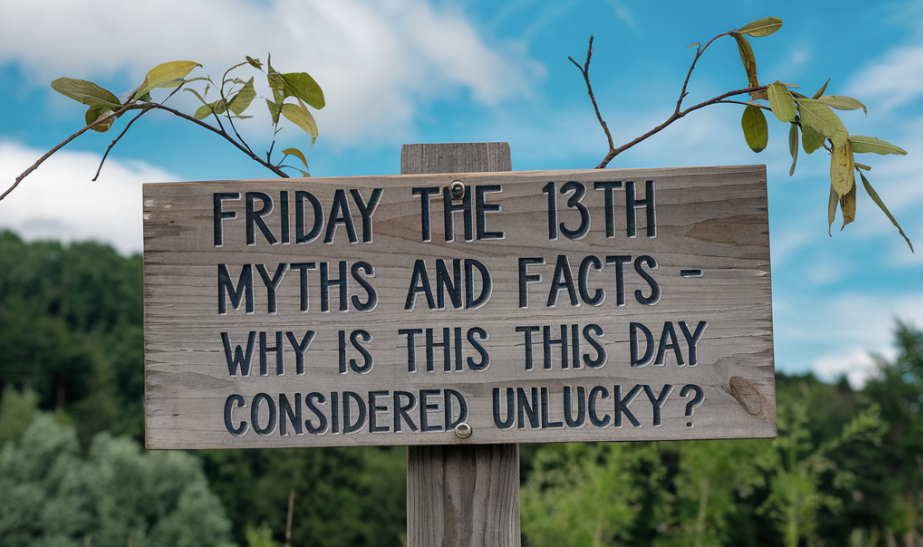Friday the 13th Myths and Facts- Why Is This Day Considered Unlucky?
Friday the 13th is a date that many associate with bad luck, superstition, and fear. But why is this day considered so ominous, and how did this belief come about? From ancient beliefs to cultural traditions, the reasons are diverse, blending religion, history, and folklore.
Let’s take a look into the origins of this unlucky day and see why Friday the 13th continues to haunt people across the world.
The Roots of 13
The number 13 has long been seen as unlucky. In many cultures, it is thought to bring bad fortune. This fear of the number has a special name: triskaidekaphobia. But where does this fear come from? One widely accepted theory links it to Norse mythology.
According to one legend, 12 gods were having a banquet in Valhalla when a 13th guest, Loki, the trickster god, crashed the party.
Loki’s actions led to the death of the beloved god Balder, marking the start of chaos.
Another religious connection comes from Christianity. The number 13 is linked to Judas Iscariot, the disciple who betrayed Jesus.
Judas was the 13th guest at the Last Supper, which took place before Jesus’ crucifixion on a Friday. This connection between 13 and betrayal has lingered in Western culture for centuries.
Why Friday?
While 13 is often seen as unlucky on its own, the addition of Friday makes it worse. Fridays have a bad reputation in history, often seen as a day of misfortune.
Some scholars believe this stems from Christian beliefs. Jesus was crucified on a Friday, now remembered as Good Friday.

In the medieval world, Fridays were often associated with punishment and suffering. Many executions were carried out on Fridays, adding to its ill-fated reputation.
Moreover, in maritime tradition, sailors believed it was bad luck to set sail on a Friday. This belief persisted through time, blending into the fear of Friday the 13th that we see today.
The Birth of the Superstition
So, how did Friday the 13th become known as a day of bad luck? One of the earliest recorded instances comes from the 19th century, when the combination of the day and number gained traction.
In particular, it’s thought that The Da Vinci Code by Dan Brown played a key role in spreading this superstition.
The book claims that on Friday, October 13, 1307, hundreds of Knights Templar were arrested by order of King Philip IV of France.
Many were later executed, adding to the association of bad luck on this day.
While this historical event may not be entirely responsible for the superstition, it certainly helped cement Friday the 13th as a day of misfortune.
Fear of Friday the 13th
The fear of Friday the 13th has a name too: friggatriskaidekaphobia or paraskevidekatriaphobia. Frigga refers to the Norse goddess for whom Friday is named, and the phobia means “fear of Friday the 13th.”
This fear is surprisingly widespread, with more than 60 million people worldwide avoiding certain activities on this day.
In fact, some people refuse to leave their houses, cut their hair, or make important decisions on Friday the 13th.
This widespread fear has practical consequences too. Airlines report a drop in passengers, people reschedule appointments, and businesses sometimes see a dip in productivity.
This phobia has even influenced architecture: many hotels and buildings skip the 13th floor, jumping straight from 12 to 14.
Similarly, some hospitals and airports omit room or gate 13 to avoid spooking superstitious guests or travelers.
Friday the 13th in Pop Culture
Friday the 13th has also left its mark on popular culture. The most famous example is the Friday the 13th horror movie series, which introduced the world to Jason Voorhees, the hockey mask-wearing killer.
The films have helped solidify the date’s eerie reputation, even though they bear little connection to the original superstitions.
Additionally, the day has inspired numerous books, TV shows, and even theme park attractions, all capitalizing on the fear and intrigue surrounding Friday the 13th.
It’s clear that the day has evolved from a superstition to a cultural phenomenon.
Is It All Bad?
Not everyone sees Friday the 13th as unlucky. Some people, particularly those born on this date, consider themselves fortunate and immune to any bad luck.
In fact, in Italy, Friday the 13th isn’t even considered unlucky. For Italians, the unlucky day is Friday the 17th.
Similarly, in some Hispanic cultures, Tuesday the 13th is the day to watch out for. These cultural differences show that the fear of Friday the 13th is not universal.
Moreover, some people have even turned the day into something positive. Events such as “Friday the 13th tattoo specials” have become popular in many cities, where tattoo parlors offer discounted tattoos on this day, turning fear into celebration.
Fun Facts About Friday the 13th
Here are some interesting tidbits about this infamous day:
- Stephen King, the famous horror writer, has admitted to having a fear of the number 13, making him a triskaidekaphobe and a friggatriskaidekaphobe.
- Franklin D. Roosevelt also had an irrational fear of Friday the 13th, often refusing to travel on this date.
- Some of the most successful people have dismissed the superstition. Many feel that it’s just another day, and they carry on without concern.
Why the Superstition Endures
Despite our modern world of science and logic, superstitions like Friday the 13th continue to endure.
The fear is often passed down through generations, and it’s reinforced by the media, movies, and popular culture.
For some, it’s simply a fun tradition, while for others, it’s a real cause of anxiety.
Humans have always tried to make sense of the unknown, and superstition provides a way to do that.
In a world where so much is out of our control, avoiding bad luck on a certain day feels like a small but manageable way to protect oneself from misfortune.
This sense of control, even if irrational, is a key reason why Friday the 13th and other superstitions continue to thrive.
FAQs
What is the fear of Friday the 13th called?
The fear of Friday the 13th is known as friggatriskaidekaphobia or paraskevidekatriaphobia.
Why is the number 13 considered unlucky?
The number 13 is seen as unlucky in many cultures, particularly in Western society. This belief is linked to religious and mythological stories, such as the Last Supper and Norse mythology.
Why is Friday unlucky?
Friday has been considered unlucky in some cultures due to its association with Jesus’ crucifixion and historical events like executions, which often took place on Fridays.
How often does Friday the 13th occur?
There are typically one to three Friday the 13ths in a calendar year. The day occurs when the 13th day of the month falls on a Friday, which happens in any month that begins on a Sunday.
Do all cultures believe Friday the 13th is unlucky?
No, not all cultures consider Friday the 13th unlucky. For example, in Italy, Friday the 17th is the unlucky day, and in some Hispanic countries, Tuesday the 13th is feared instead.
Friday the 13th may be filled with superstition, but in reality, it’s just another day. Whether you view it with fear or dismiss it as a quirky tradition, the stories behind this day will continue to captivate for years to come.



